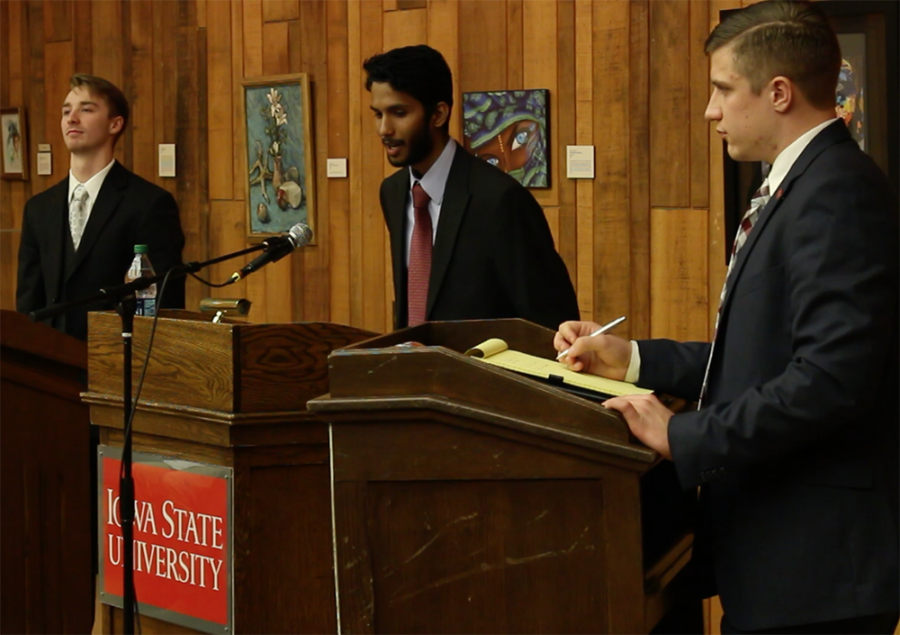Presidential candidates debate student issues
Michaela Ramm/Iowa State Daily
Left to right, Zackary Reece, Raghul Ethiraj and Cole Staudt question each other’s platforms during the 2016 Student Government Presidential Debate on Feb. 26.
February 26, 2016
The presidential candidates for Student Government faced off in a debate Friday in the Pioneer Room of the Memorial Union.
Presidential hopefuls Sen. Cole Staudt, Sen. Zackary Reece and Raghul Ethiraj spent most of the night questioning one another’s platform and viability.
One of the first topics was diversity. Reece, junior in political science, has said he would like to add a member of the international student council to his cabinet.
Reece was asked if he would add cabinet members from other underrepresented groups. Reece explained that he would determine that qualification by how big of a percentage of the student population that group is.
“Just appointing based on percentages is the wrong way to go, I think,” Staudt said.
Staudt went on to say that diversity is a problem at Iowa State, and that is why he would combine the university administration’s diversity committee and the Student Government’s diversity committee into a task force to confront these issues head on and be more proactive instead of reactive.
The debate included discussion about a proposal of Ethiraj’s, senior in aerospace engineering, to implement heated CyRide bus stops.
He said thay had been implemented in St. Paul, Minn., and through his research, verified the cost of each installation at $6,000 to $8,000.
“Student Government currently sits on $600,000 already that they do not allocate,” Ethiraj said. “[Heated bus stops] are very feasible.”
Reece then said he had also researched the heated bus stops in St. Paul, which actually cost anywhere from $15,000 to $75,000 and were very limited in the area.
Ethiraj countered by saying that was the cost of a brand new bus shelter, not upgrading the stops. Staudt said the $600,000 is not renewable and was a result of combining certain accounts and shouldn’t be spent frivolously.
“Student activity fees are not for infrastructure upgrades,” Staudt said. They are for student organizations.”
Ethiraj took issue with Staudt’s plan to reform printing credits, saying there is already a plan in place to extend credits if need be.
Ethiraj and Reece also questioned the likelihood of getting the policy of Dead Week changed.
“The university can’t even give us a half day for a blizzard, and [Staudt] is wanting two full days off,” Ethiraj said. “We all want ponies, but that is unrealistic too.”
Staudt said the faculty is on board with changing the Dead Week policy, including the graduate and pre-professional faculty, but Reece said the graduate faculty he has talked to were not in favor of it.
Each candidate said the other candidates had the leadership skills and passion to get things done for students and make campus life better. All agreed that whoever won the election would be a great president.
Student Government voting will take place March 1 and 2. Results will be announced March 7.

















